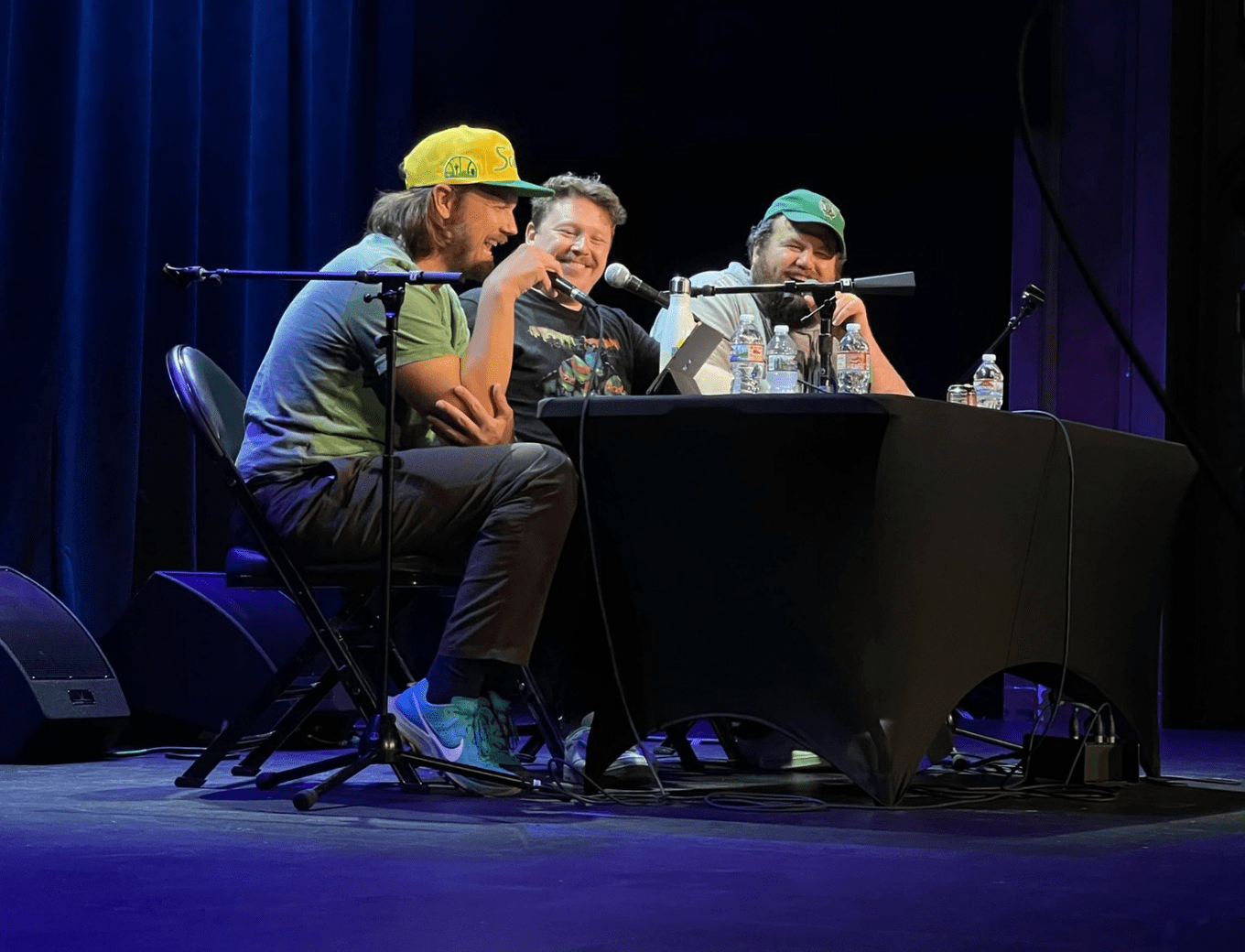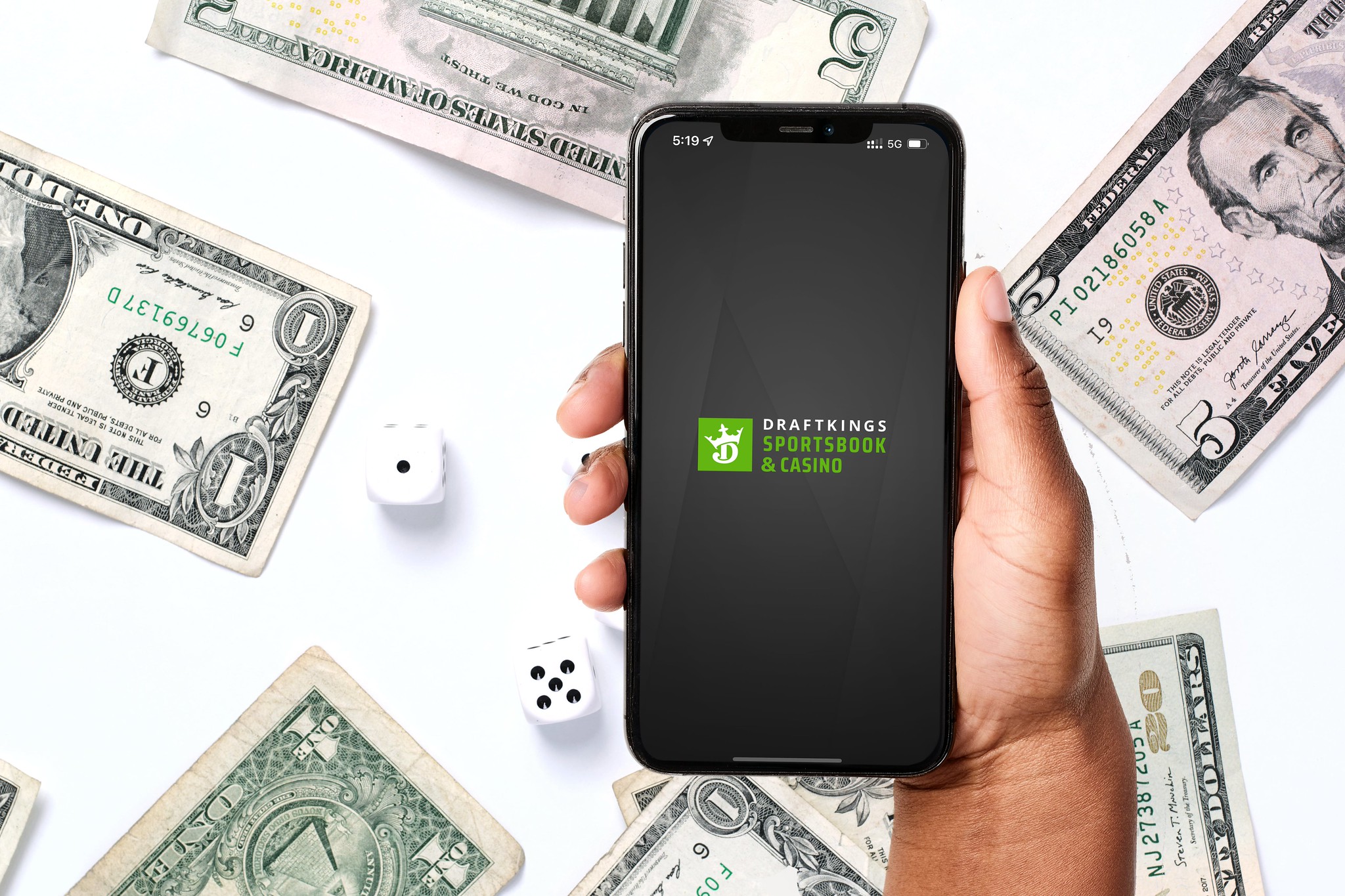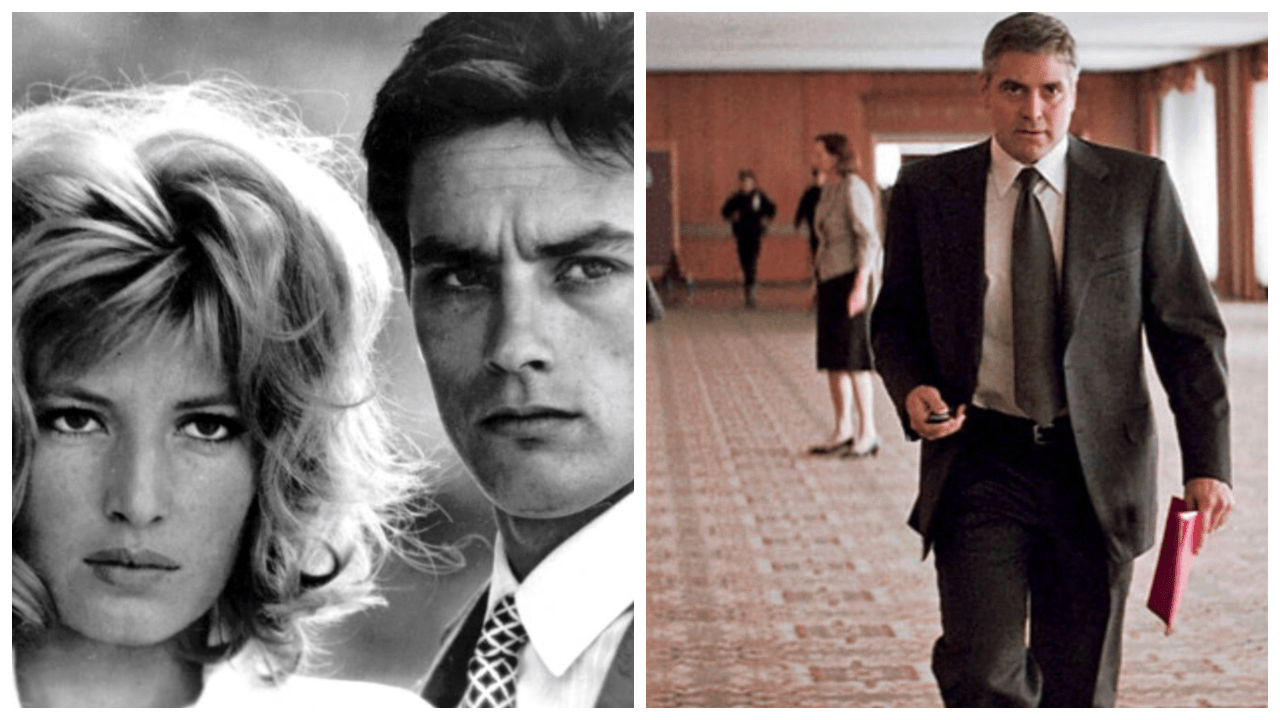Each week, the folks at First Avenue send out two newsletters: one rounding up everything that was either just announced or went on sale, and another that lists every show that’s happening across their family of venues that week. It’s a lot, and events can get buried. So they also send out a more targeted newsletter from time to time, one that’s either venue-specific or otherwise highlights a more specialized list of shows.
It was in compiling one of these recently that First Ave marketing VP Ashley Ryan realized the number of podcasts they’ve been booking lately.
“We just sent one out that was non-music events, because we have so many podcasts, and comedians. We have, like, a magic show coming up,” Ryan says. “It’s not all podcasts, but we started going through the calendar and we were like, ‘Holy hell, we’ve got, like, six podcasts coming in the next two months.’”
Maybe you’ve noticed it, too—the slow creep of shows with names like Last Podcast on the Left and Giggly Squad on the calendar next to Bright Eyes and Rebecca Black. “Comedy Bang! Bang! … is that like Panic! At the Disco?” you wonder, and it’s not! It’s a UCB stage show turned podcast, one of dozens that came through the Twin Cities over the last year.
When and why did podcast tours come to be so prevalent? What makes a podcast, generally the soundtrack to your commute or your daily hot girl walk, work in a live show setting? And how are so many of them selling out these spaces?
We talked to podcast hosts and the folks who book ‘em to find out.
“I just want these voices I’ve heard to be real.”
A 2015 business meeting at a Cheesecake Factory would forever change the creative and financial lives of Nick Wiger and Mike Mitchell. They were the only parties in attendance that day inside the glitzy Los Angeles mall The Grove, where the two comics met to gameplan a potential podcast. The setting proved prophetic.
At the time, Wiger and Mitchell were members of two cult-loved improv troupes—A Kiss From Daddy and the Birthday Boys, respectively—that would collaborate monthly on a live show at the Upright Citizens Brigade Theater. The double-bill would draw around 100 comedy nerds, they report. On June 23, the podcast Wiger and Mitchell hatched over those voluminous Cheesecake Factory menus, Doughboys, will headline the 1,500-capacity Fillmore in Minneapolis.
“Do you want us to be honest? Zero. There were zero business aspirations,” Mitchell says of Doughboys, his eventual hit podcast that features weekly chain restaurant reviews with celeb guests like Scott Aukerman, Nicole Byer, and Minnesota's own Chris Pratt; the hilarious interplay between its two hosts inspires comedic worldbuilding that attracts passionate listeners—aka The Freaks.
“It wasn’t like, ‘Hey, let’s build a fuckin’ rocket ship, we’re taking this thing to the moon!” adds Wiger. “We were out-of-pocket financially—paying for the show, and losing money on it—really until 2017.”
That’s when Doughboys launched its Patreon membership program, which remains the biggest driver of funds; the podcast ranks among the 100 highest-earning Patreon accounts, according to Graphtreon, and its 11,542 supporters pledge $5 or $8 per month for premium episodes. You can do the salary math. “It never felt like There Will Be Blood, where we struck oil,” Mitchell says.
The ‘Boys take their pod on the road for fan outreach, fun, and supplemental income. A listener actually suggested they tour back in ’17, and he helped book an early run of Doughboys live shows at smaller rock clubs. At times they’d play to as few as 35 people, Mitchell reports, though his podcast/sparring partner disputes that figure.
Does the barebones live performance setup—table, chairs, mics—ever feel daunting, considering folks pay $40 to attend?
“It never really scared me until you just asked that question,” Mitchell says with a chuckle. “There are 15-minute stretches where we’re talking about a cheeseburger.”
“It’s the strangest thing to be like, ‘OK, we’re going to go out and talk in front of an audience for like two hours, and that’s what people are paying to see’” Wiger adds. “I think where I made peace with it was like, ya know what, people listen to us two times a week, they’ve gotten used to our voices… and part of it is like, ‘I just want these voices I’ve heard to be real.’”
That limited overhead doesn’t always translate to Whopper-sized paydays. The Doughboys insist on paying their live touring guests and audio engineers, traveling by Delta Comfort+ airplane, and staying in “not a shithole” hotels. “We’re not young, cool musicians: We’re fussy middle-aged men,” Wiger says, adding that they actually lost money once on a sold-out show in Nashville. They’ve avoided rockstar egos, even when we note that The Fillmore’s capacity is higher than First Avenue, the venue Prince made famous.
“Do you think that’s a microcosm for the decline of culture?” Wiger says with a self-deprecating laugh.
Culture is the bread ‘n’ butter of You’re Wrong About, which was launched in 2018 by journalists Michael Hobbes and Sarah Marshall. Hobbes has since left the pod, but Marshall keeps exploring the show’s premise: revisiting people, events, or crazes that may have been misportrayed by memory and/or media—the Satanic Panic, Anna Nicole Smith, acid rain, the Ford Pinto—and revealing (often more accurate) counternarratives. It’s conversational, rigorous, funny, and always empathetic.
If there’s an Oscars for podcasting, it might just be iHeartRadio Podcast Awards, and YWA took home the award for Best Podcast at the 2022 celebration. (Doughboys snagged Best Food Podcast.)
Marshall channeled that momentum into the show’s first “full size” tour, one that stopped last month at the 400-capacity Cedar Cultural Center in Minneapolis. (Previously, YWA had embarked on one mini tour and even one gig on a cruise ship.) The Portland, Oregon-based podcaster isn’t a trained performer, but in the wake of Covid-19 and her father’s recent death, Marshall says she needed a jolt.
“It’s really one of those times when you’re on a quest to make yourself feel something. And it worked! I feel like a big battery; I feel all charged up,” she says. “You can know in your brain that people are listening, and you’re having an effect on them. But to come together in the classic, pre-technological, human way feels great… it feels right.”
Fans were eager to put a face to the voice that entertained and informed ‘em through the pandemic, and the show’s $35 tickets sold out weeks ahead of time. Marshall and the Doughboys agreed (thank goodness!) with our premise that it’s a boom time for live podcasting. As the medium matures, it’s being stripmined for profit potential, Marshall argues, often at the peril of listeners. Podcast advertising revenue hit $1.4 billion in 2021, according to a study from the Interactive Advertising Bureau, and it’s projected to soar past $4 billion by next year.
“I think podcast networks don’t quite understand how to get the money out of them,” Marshall says. “They know there’s money to be made, and I see a lot of podcasts that are more ad than show, more machine than man now. Respect for the audience has to win the day. And that’s unfamiliar for a lot of people.”
Many listeners barrelled through the pandemic with their favorite podcast hosts, forging parasocial relationships amid a locked-down moment in an era of epidemic loneliness. Seeing those living, breathing personalities inside a venue, surrounded by fellow fans, can inch those relationships closer to something approximating IRL bonding.
“This is a particular moment for the medium,” Marshall says. “The thing people say to me, maybe most often, is that the show got them through the pandemic, you know? There’s more of a feeling of intimacy now with these shows that we love, and maybe we want to experience them as live shows. I think it makes sense.”
True crime—for better or worse—has emerged as the dominant podcast genre. And nobody has seized on that locally as well as Wine & Crime, a podcast whose premise is easy to understand and enjoy: “Three childhood friends as they chug wine, chat true crime, and unleash their worst Minnesota accents.” The show launched in 2017 with an episode on necrophiliacs, and has since ballooned into a legit heavy-hitter in a very crowded, gory space.
“What draws people into our show is maybe the true crime, but what keeps them is our relationship as childhood friends,” explains Amanda Jacobson, who co-hosts the free-flowing Wine & Crime with Lucy Fitzgerald and Kenyon Laing. “We tell these oftentimes very gruesome stories, but throughout the show, we’re also telling stories about ourselves, embarrassing childhood memories—it’s very PEN15.”
Jacobson says the inspiration to go live came from watching more established true-crime pods like My Favorite Murder and Last Podcast on the Left pack venues, though her ambitions would start much smaller. Episode No. 22, a locally angled examination of notorious murderers, was recorded live in front of 100 folks at Bauhaus Brew Labs in northeast Minneapolis.
The enterprise has grown considerably since then. Pre-pandemic, in the summer of 2019, Wine & Crime embarked on a full-blown national tour before live entertainment effectively shut down. The gals exited Covid in a big way, with a headlining date last summer at St. Paul’s 1,058-capacity Fitzgerald Theatre. On July 8, they’re scheduled to play New York City’s 650-cap Gramercy Theatre.
“There’s something so cathartic and therapeutic and connected about being in a room full of strangers and everyone laughing together,” Jacobson says. “It’s like church, if I went to church. And it’s fun! It’s like a high that I want to chase for the rest of my life.”
In terms of the material, Wine & Crime live shows tend to skew lighter. (Sorry to the necro-heads.) Jacobson says the dialogue is more akin to stand-up comedy, and less fixated on history’s sickest killings. They view the audience as “kind of the fourth gal,” even if there happens to be 1,000+ fourth gals in attendance.
“Podcasting is a medium with a level of intimacy that I just don’t think you see in other forms of entertainment,” Jacobson says. “They form bonds with us because they know so much about us, and we’re so open about our bowels, and our sexuality, and everything that’s going on in our lives. I know they call these, what, parasocial relationships? But they’re meaningful. And when they have the opportunity to then share space with you physically and possibly have a conversation with you or meet you or whatever… it’s just a next-level experience.”
“It’s like your friends are coming to town, and you can go see them.”
Lisa Krohn, director of booking for Hennepin Theatre Trust (State, Orpheum, Pantages), first noticed the live podcast phenomenon about three years ago. Now, there are almost always a few podcasts on the HTT calendar. This week alone, they’ve announced the Boy Meets World podcast Pod Meets World (tickets go on sale this Friday) and the return of Not Another D&D Podcast, which has already appeared at the Pantages once before.
“We had Not Another D&D Podcast; I didn’t know what the heck it was, I’m not a D&D player,” Krohn says. “But the agent encouraged me to give it a try, and it sold out.”
Ashley Ryan at First Ave says she first had the “wow, we’re booking a lot of podcasts now!” realization a few years before the pandemic hit, as popular productions like Pod Save America started coming to town. That momentum ground to a halt, obviously, when Covid put live productions of all kinds on hold.
But as You’re Wrong About’s Marshall noted, the pandemic would eventually be the thing that put podcast listenership and subscriber numbers through the roof. Nielson reports that in the U.S., the podcast listener base grew by 40% between 2019 and 2022; more than half of those surveyed started listening during the lockdown years.
Live podcasts have become an international phenomenon: In December, The Guardian reported on “how podcasts became arena fillers,” with the number of live podcasting events spiking 2,000% between 2013 and 2022. And as pre-pandemic activities, including live events, have resumed, venues now find themselves consistently adding podcasts to their calendars.
It’s more than just the pandemic, of course. For one, it’s easier than ever to tune in: “Your phone comes with an app on it, built in, for podcasts, and then there’s Apple Music, and Spotify,” Ryan notes (the latter of which invested more than $1 billion in podcasts beginning in 2019). They’re more easily accessible than ever, and in most cases, they’re also free, or at least cheap, to access. The content is just out there on the internet.
Ryan notes that these days, there’s a podcast for everyone. “They are so niche. We have one coming up called Obitchuary, and it’s literally people reading obituaries,” she laughs. (Not to be confused with Obituary, the metal band that’s also heading for the Fine Line this month.) They’ve hosted Bravo podcasts (Watch What Crappens) and food podcasts (Go Fork Yourself) and anime culture podcasts (Trash Taste). And the podcasts have come to nearly every room First Ave runs: Amsterdam, Turf Club, the Fine Line, the Fitzgerald, the Palace Theatre. After a quick mental flip through the calendar, Ryan says the Mainroom might be the only one of their venues that hasn’t yet hosted a podcast.
Podcasts let First Ave use their spaces creatively, figuring out what might work in different venues—especially with theaters like the Fitz, which MPR had already retrofitted to host authors, lecturers, and live radio shows.
And the live shows are a win-win-win for venues, podcasts, and the folks who listen to them.
“Web-based acts these days, they just come with a built-in audience,” adds Krohn. “They’re great because you don’t need to spend much money advertising. Fans know where to go because they follow them on their social channels. You just put it out there, and all the people around here that like them, they know about it, and they come.”
Ryan herself listens to a handful of podcasts on a regular basis, enough that when she hears them, it feels like listening to somebody she knows.
“And so I think there is something that’s like, these are my—‘friends’ is probably a stretch,” she explains. “But these are familiar people to me. And when they come to town, I can go meet them, or see them, or hear from them in real life. I think the podcast community, the hosts and the people producing them, have understood the connection that they’re making with fans in a way that’s not dissimilar from any other artist.”
Krohn says she’s been kind of blown away by the audience response to IRL podcast productions.
“The nature of a podcast is that you listen to it without seeing anything… I was kind of baffled by it,” she says. “I can kind of see, now that I’ve been to a few of ‘em, they just love being in the same room as them. The audience is just so excited to see them in person, watch the process. I guess it’s kind of like seeing Garrison Keillor live with Prairie Home Companion.”
Ryan agrees: Minnesota has a long history of listening to and supporting public radio that predates the pandemic, and even the podcast, thanks to MPR producing popular audio shows like Splendid Table.
“I used to listen to Lynne Rossetto Kasper, and I still tune into Wait, Wait, Don’t Tell Me. I still appointment-listen to some of those classic talk-radio programs,” she says. “I think there’s a history pre-podcast of interesting programming here too. But [these days] it’s just so much more niche, and there’s so many more outlets for it.”
“It was like having a friend over, listening to a podcast during the pandemic,” she adds. “Now, it’s like your friends are coming to town, and you can go see them.”






